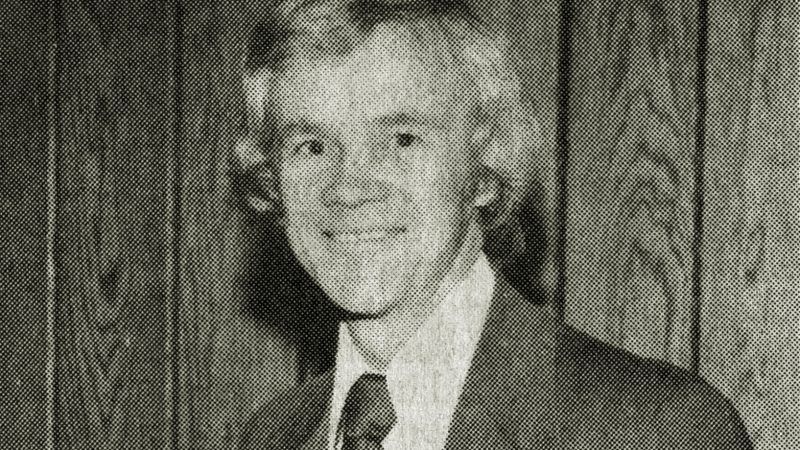David Bergland, R.I.P.
The Libertarian Party's 1984 presidential nominee wanted his campaign to build for the future.

David Bergland, the Libertarian Party's 1984 presidential candidate, died last week at age 83 of prostate cancer.
Bergland's interest in libertarianism began with Ayn Rand and Objectivism, and after attending a Libertarian Party meeting in Orange County in 1973 he became the young party's 1974 candidate for attorney general in California. Two years later, he was tapped to be the party's national vice-presidential candidate—a fresh face who showed up late at the convention and became an acceptable compromise candidate after a heated struggle between others.
After serving five years as the party's national chair, he became its presidential nominee in 1984 (again more or less as a compromise candidate, when one of the expected main contenders dropped out at the last minute). Running against Ronald Reagan and Walter Mondale, he earned a bit over 228,000 votes.
That was a big comedown after the Ed Clark/David Koch ticket of 1980, which had earned more than 921,000, but the party had lost much of its financial backing and experienced management support when the forces surrounding Ed Crane and the Koch brothers pulled out of the party, unhappy that their preferred candidate—Earl Ravenal—failed to get the '84 presidential nomination.
As Bergland told me in an interview for my book Radicals for Capitalism, "We didn't really have any campaign organization at the time of the convention, and as we tried to get set up and rolling all the Koch money was gone and the Crane people [were] not gonna bother with my campaign, so we thought: What can we do on short budget and with the primary asset the candidate? We decided the thing to do was to educate journalists. I could spend time most productively and build for the future by trying to do as good a job as possible getting journalists clear on who we were and what we stood for…
"[A] majority [of reporters] didn't know much of anything about us, and what they did know was a little bit wrong, but they were eager to know and very respectful. They weren't saying you guys are nuts for doing what you're doing, except for the standard: 'You don't have a chance to win, so why are you running?' I'd say, 'Mondale doesn't have a chance to win. Why don't you ask him that question?'"
Bergland's media strategy indeed got libertarian ideas in American newspapers, from Montana's Great Falls Tribune to Wisconsin's Stevens Point Journal, explaining a variety of then-quite-eccentric notions: that the U.S. doesn't need and can't afford to have tons of overseas military bases that don't defend the homeland, that education could be better done by private entities than government ones, that the state should prohibit neither drugs nor pornography nor gun ownership nor abortion.
Outside his libertarian activism, Bergland practiced law as a business attorney in private practice and taught law as an adjunct professor at Western State University College of Law in Fullerton, California and Irvine, California. He wrote an introductory book on libertarian thought for his campaign, Libertarianism in One Lesson.
Bergland wrote about his experience running for president for Reason, including this example of why he saw Libertarian presidential campaigns as having media benefits regardless of vote totals:
One young reporter [at an Albany, NY, press conference] was prompted to ask, "Mr. Bergland, would you describe our government as a totalitarian government?" After some thought, I responded, "No, not so long as we have a free press and open elections." How would I describe our government, he asked. I said the best description is "a corporate-fascist, welfare-warfare state."
The reporter asked to know what I meant. I explained…the hand-in-glove relationship between big government and big business—the subsidies, the bailouts, the protections against competition, the pervasive regulatory schemes—justify the "corporate-fascist" label. I added that our huge, costly, and demeaning welfare plantation system that benefits government employees while hurting the poor, and our global interventionist foreign policy that results in ever-increasing military spending and benefits the military-industrial complex at the expense of the people, justify the "welfare-warfare" label.
Those comments went out on the wire services, and for several days I had many opportunities to elaborate on my characterization of our government as a corporate-fascist, welfare-warfare state. No other presidential candidate, particularly Reagan or Mondale, is willing to challenge prevailing political views in such strong and accurate terms.
Every Libertarian presidential candidate since Bergland beat his national vote totals, which is exactly as he thought it should be.
The details of Bergland's life, and memorial testimonials from many fellow party activists, can be found at the website of the Zero Aggression Project.
